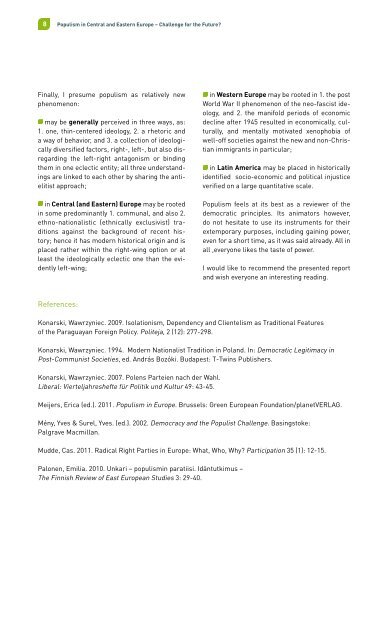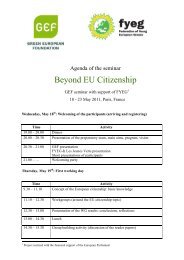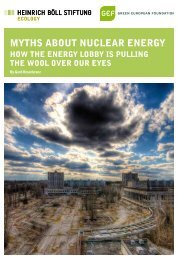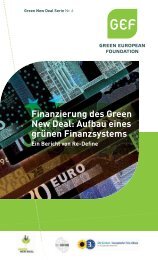Populism in Central and Eastern Europe â Challenge for the Future?
Populism in Central and Eastern Europe â Challenge for the Future?
Populism in Central and Eastern Europe â Challenge for the Future?
- No tags were found...
Create successful ePaper yourself
Turn your PDF publications into a flip-book with our unique Google optimized e-Paper software.
8 <strong>Populism</strong> <strong>in</strong> <strong>Central</strong> <strong>and</strong> <strong>Eastern</strong> <strong>Europe</strong> – <strong>Challenge</strong> <strong>for</strong> <strong>the</strong> <strong>Future</strong><br />
F<strong>in</strong>ally, I presume populism as relatively new<br />
phenomenon:<br />
may be generally perceived <strong>in</strong> three ways, as:<br />
1. one, th<strong>in</strong>-centered ideology, 2. a rhetoric <strong>and</strong><br />
a way of behavior, <strong>and</strong> 3. a collection of ideologically<br />
diversified factors, right-, left-, but also disregard<strong>in</strong>g<br />
<strong>the</strong> left-right antagonism or b<strong>in</strong>d<strong>in</strong>g<br />
<strong>the</strong>m <strong>in</strong> one eclectic entity; all three underst<strong>and</strong><strong>in</strong>gs<br />
are l<strong>in</strong>ked to each o<strong>the</strong>r by shar<strong>in</strong>g <strong>the</strong> antielitist<br />
approach;<br />
<strong>in</strong> <strong>Central</strong> (<strong>and</strong> <strong>Eastern</strong>) <strong>Europe</strong> may be rooted<br />
<strong>in</strong> some predom<strong>in</strong>antly 1. communal, <strong>and</strong> also 2.<br />
ethno-nationalistic (ethnically exclusivist) traditions<br />
aga<strong>in</strong>st <strong>the</strong> background of recent history;<br />
hence it has modern historical orig<strong>in</strong> <strong>and</strong> is<br />
placed ra<strong>the</strong>r with<strong>in</strong> <strong>the</strong> right-w<strong>in</strong>g option or at<br />
least <strong>the</strong> ideologically eclectic one than <strong>the</strong> evidently<br />
left-w<strong>in</strong>g;<br />
<strong>in</strong> Western <strong>Europe</strong> may be rooted <strong>in</strong> 1. <strong>the</strong> post<br />
World War II phenomenon of <strong>the</strong> neo-fascist ideology,<br />
<strong>and</strong> 2. <strong>the</strong> manifold periods of economic<br />
decl<strong>in</strong>e after 1945 resulted <strong>in</strong> economically, culturally,<br />
<strong>and</strong> mentally motivated xenophobia of<br />
well-off societies aga<strong>in</strong>st <strong>the</strong> new <strong>and</strong> non-Christian<br />
immigrants <strong>in</strong> particular;<br />
<strong>in</strong> Lat<strong>in</strong> America may be placed <strong>in</strong> historically<br />
identified socio-economic <strong>and</strong> political <strong>in</strong>justice<br />
verified on a large quantitative scale.<br />
<strong>Populism</strong> feels at its best as a reviewer of <strong>the</strong><br />
democratic pr<strong>in</strong>ciples. Its animators however,<br />
do not hesitate to use its <strong>in</strong>struments <strong>for</strong> <strong>the</strong>ir<br />
extemporary purposes, <strong>in</strong>clud<strong>in</strong>g ga<strong>in</strong><strong>in</strong>g power,<br />
even <strong>for</strong> a short time, as it was said already. All <strong>in</strong><br />
all ,everyone likes <strong>the</strong> taste of power.<br />
I would like to recommend <strong>the</strong> presented report<br />
<strong>and</strong> wish everyone an <strong>in</strong>terest<strong>in</strong>g read<strong>in</strong>g.<br />
References:<br />
Konarski, Wawrzyniec. 2009. Isolationism, Dependency <strong>and</strong> Clientelism as Traditional Features<br />
of <strong>the</strong> Paraguayan Foreign Policy. Politeja, 2 (12): 277-298.<br />
Konarski, Wawrzyniec. 1994. Modern Nationalist Tradition <strong>in</strong> Pol<strong>and</strong>. In: Democratic Legitimacy <strong>in</strong><br />
Post-Communist Societies, ed. András Bozóki. Budapest: T-Tw<strong>in</strong>s Publishers.<br />
Konarski, Wawrzyniec. 2007. Polens Parteien nach der Wahl.<br />
Liberal: Vierteljahreshefte für Politik und Kultur 49: 43-45.<br />
Meijers, Erica (ed.). 2011. <strong>Populism</strong> <strong>in</strong> <strong>Europe</strong>. Brussels: Green <strong>Europe</strong>an Foundation/planetVERLAG.<br />
Mény, Yves & Surel, Yves. (ed.). 2002. Democracy <strong>and</strong> <strong>the</strong> Populist <strong>Challenge</strong>. Bas<strong>in</strong>gstoke:<br />
Palgrave Macmillan.<br />
Mudde, Cas. 2011. Radical Right Parties <strong>in</strong> <strong>Europe</strong>: What, Who, Why Participation 35 (1): 12-15.<br />
Palonen, Emilia. 2010. Unkari – populism<strong>in</strong> paratiisi. Idäntutkimus –<br />
The F<strong>in</strong>nish Review of East <strong>Europe</strong>an Studies 3: 29-40.










